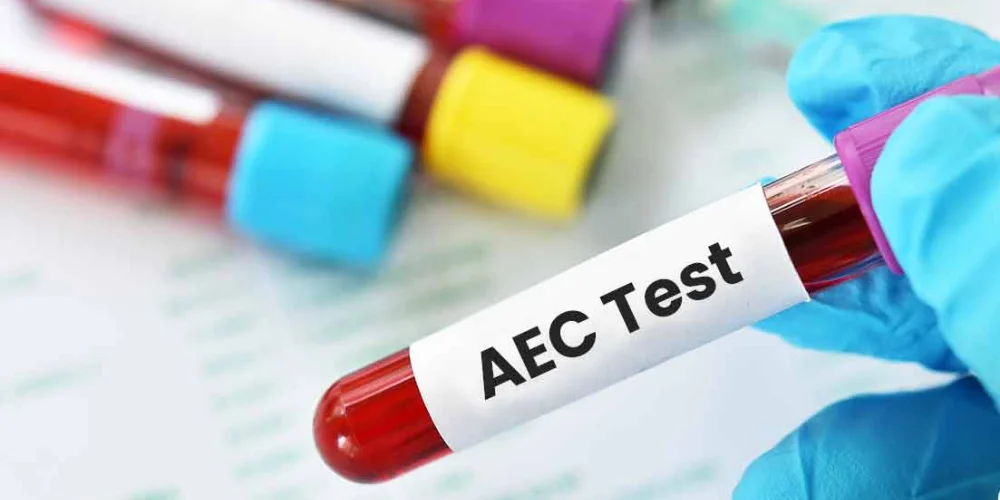Absolute Eosinophil Count Test
Assessment for Allergic and Inflammatory Conditions
The Absolute Eosinophil Count (AEC) Test is a blood test that is used to count the number of eosinophils present in blood. Eosinophils are a kind of white blood cell that play crucial roles within the immune system especially in the fight against parasite-related allergies, infections, and autoimmune disorders. When analyzing the eosinophil count health professionals are able to gain insight into a variety of diseases and the activity of the immune system. This test is crucial to diagnose and monitor diseases such as allergic rhinitis, asthma as well as eosinophilic esophagitis and specific diseases. A precise assessment of the eosinophil level assists in the development of the right treatment plan and managing the patient’s health effectively.

When is the Absolute Eosinophil Count Test Prescribed?
AEC Test is a test that can be used in a variety of clinical scenarios. AEC Test is prescribed in many clinical scenarios, which include:
- Allergic Reactions : To diagnose and monitor allergic conditions such as asthma, hay fever, and eczema.
- Parasitic Infections : To detect and evaluate infections caused by parasites, including roundworms and hookworms.
- Autoimmune Diseases : To assess immune system activity in diseases like eosinophilic esophagitis and eosinophilic granulomatosis with polyangiitis.
- Hematologic Disorders : To monitor certain blood disorders and cancers, such as Hodgkin’s lymphoma and eosinophilic leukemia.
Preparation for the Absolute Eosinophil Count Test
The preparation in preparation for AEC Test preparation AEC Test generally involves no fasting since it is not required to pass this test. However, it is essential to inform your doctor about any supplements or medications you take, since they can alter the levels of eosinophil and could affect test results.
Parameters Considered During Absolute Eosinophil Count Test
AEC Test AEC Test measures the absolute amount of eosinophils present in the blood. Important parameters include the normal eosinophil count that typically ranges between 300 to 500 cells in a microliter blood. An increase in the number of eosinophils indicates an eosinophilia condition, which may result from an allergic reaction, parasitic infection or diseases of the hematology and immune system. An eosinophil count that is low could be a sign of a problem with bone marrow function or the effects of certain medications. These indicators provide crucial information regarding the health of the immune system and possible underlying issues helping healthcare professionals in making precise diagnosis and plans for treatment.
Time Required for Absolute Eosinophil Count Test Report
AEC Test AEC Test is a quick procedure. After taking an in-person blood sample, the results can be obtained within a couple of hours to one day, based on the lab’s processing times. This quick turnaround ensures prompt evaluation and treatment of any underlying ailments.
Absolute Eosinophil Count Test Price
The test is offered at Chirayu Super Speciality Hospital, Chirayu Super Speciality Hospital, the Absolute Eosinophil Count Test is priced at Rs500 and provides an affordable solution for diagnostic tests. The reasonable price reflects our commitment to provide affordable and top-quality healthcare to our patients.
Book an Appointment for Absolute Eosinophil Count Test
Scheduling an appointment for the Absolute Eosinophil Count Test at Chirayu Super Speciality Hospital is easy and quick. You can book your test online on our website, and you can select a suitable time slot. Additionally, our staff is ready to assist you with appointment scheduling as well as any questions you might need to answer, making sure that it is a seamless and effective process for every patient.
What Our Patients Say
Hear from our valued patients about their experiences at Chirayu Super Speciality Hospital and how our care has made a positive impact on their health and well-being.


Great experience with minimal wait time for my eosinophil count test at Chirayu Hospital.


Accurate and quick eosinophil test results helped manage my autoimmune condition effectively.


Caring and knowledgeable staff ensured a comfortable eosinophil test experience.


Highly recommend Chirayu Hospital for their reliable diagnostic services.


Comprehensive care and thorough explanations provided during my eosinophil test appointment.


Affordable eosinophil count test with excellent customer service.
Frequently Asked Questions
Here, we provide answers to some of the most commonly asked questions to help you better understand our services, policies, and facilities. If you have any additional questions, please do not hesitate to contact us.
The test measures the number of eosinophils in the blood to assess immune system activity and detect various conditions.
No, fasting is not required for this test.
Elevated counts can be caused by allergic reactions, parasitic infections, autoimmune diseases, and certain cancers.
The test involves a simple blood draw, which may cause slight discomfort but is generally well-tolerated.
Results are typically available within a few hours to a day